Personal Reflection on Emotional Intelligence and Leadership - MBA502
VerifiedAdded on 2023/01/18
|9
|2226
|23
Essay
AI Summary
This essay is a personal reflection on emotional intelligence, fulfilling the requirements of an MBA502 assignment. The student conducted self-assessments and gathered feedback from peers using the Global Emotional Intelligence Test (GEIT) and Daniel Goleman's EQ Instrument. The Johari Window model is employed to analyze the results, identifying strengths such as self-awareness and enthusiasm, and weaknesses in rapport building and conflict management. The essay highlights the importance of emotional intelligence in leadership, emphasizing the need to improve communication skills, recognize others' emotions, and develop conflict management abilities. The student aims to enhance these skills to become a more effective team member and future leader, focusing on areas like active listening, feedback sharing, and understanding others' emotions to foster stronger teamwork and organizational outcomes. The essay also includes references from various sources to support the arguments and findings.
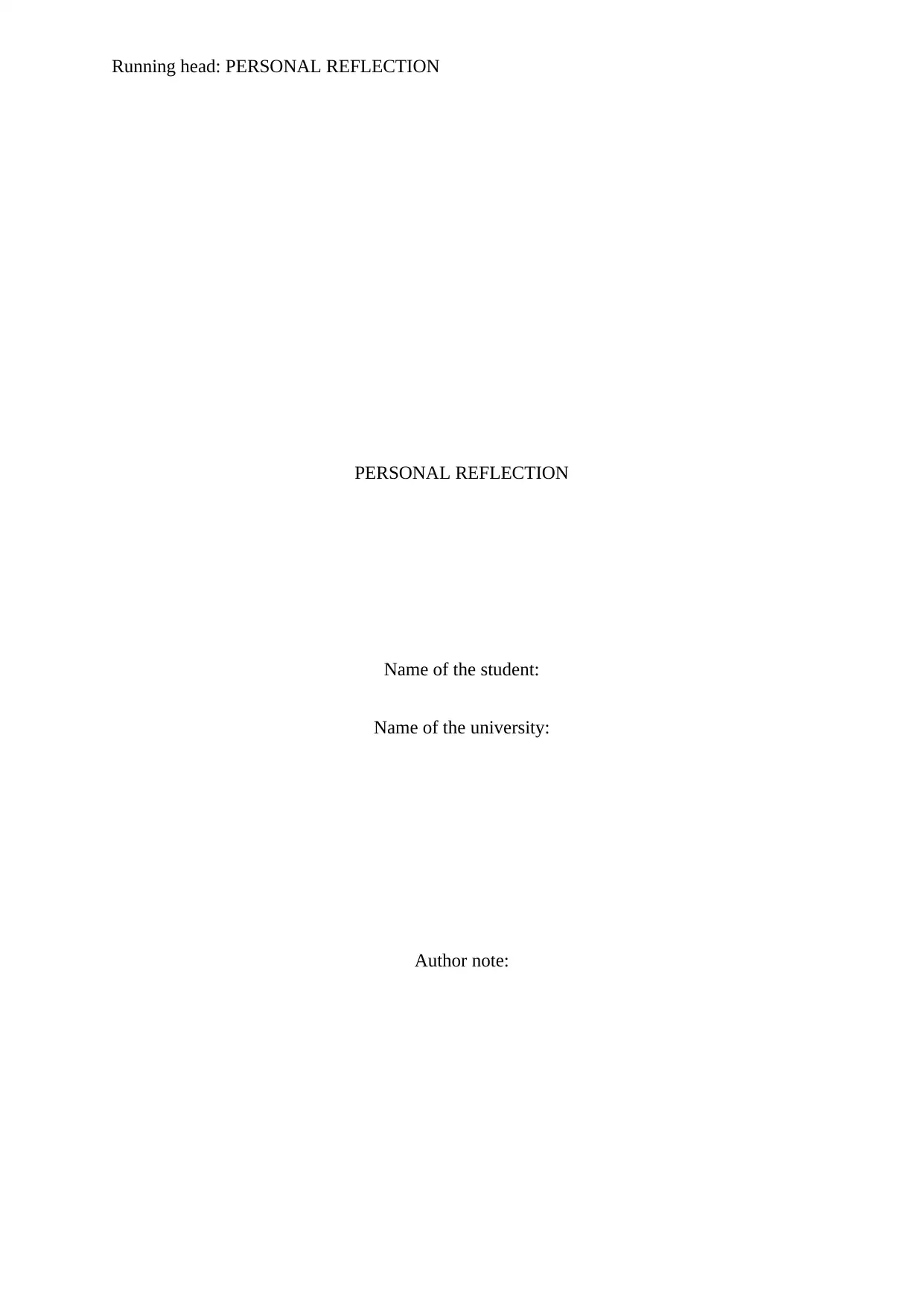
Running head: PERSONAL REFLECTION
PERSONAL REFLECTION
Name of the student:
Name of the university:
Author note:
PERSONAL REFLECTION
Name of the student:
Name of the university:
Author note:
Paraphrase This Document
Need a fresh take? Get an instant paraphrase of this document with our AI Paraphraser
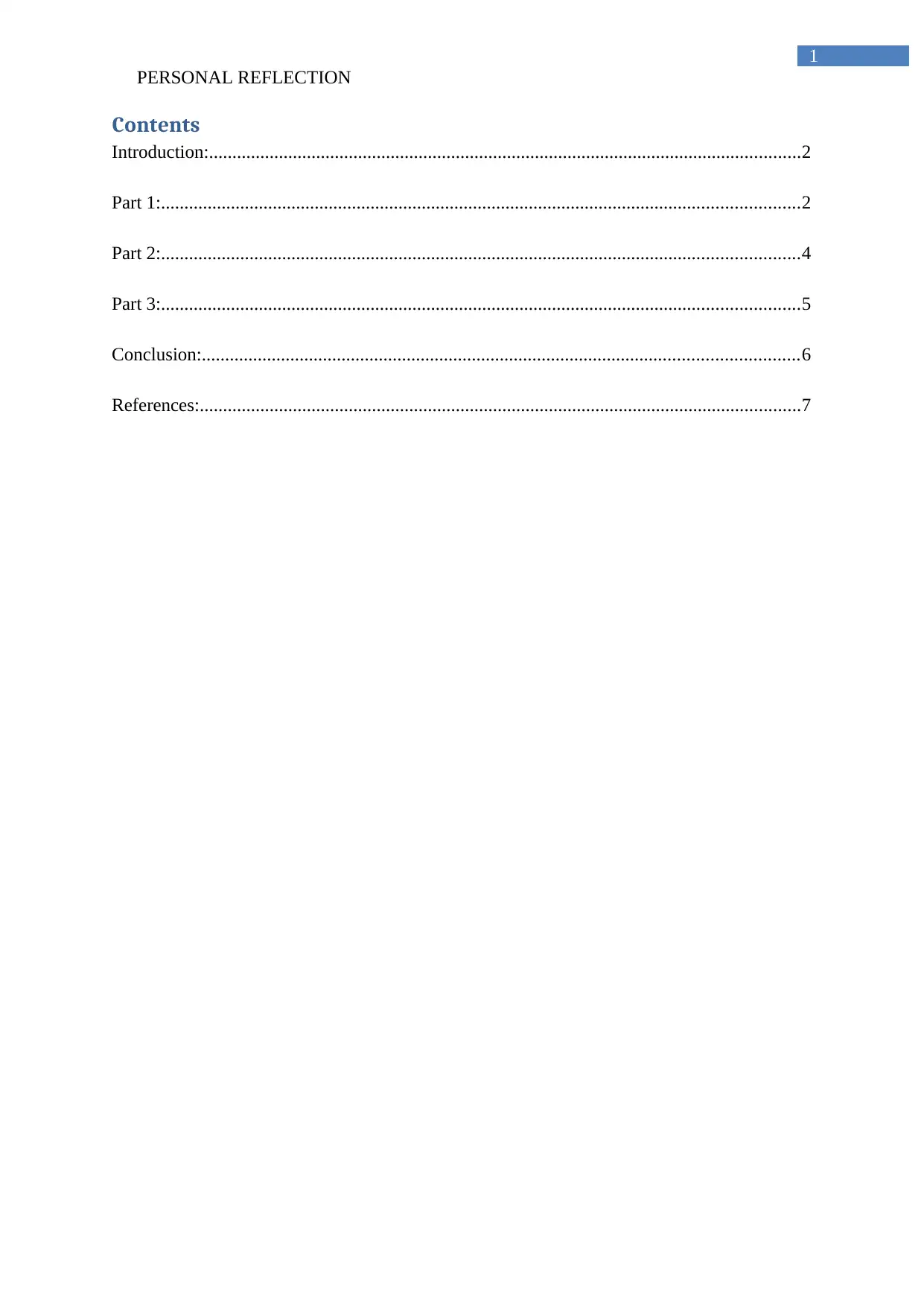
1
PERSONAL REFLECTION
Contents
Introduction:...............................................................................................................................2
Part 1:.........................................................................................................................................2
Part 2:.........................................................................................................................................4
Part 3:.........................................................................................................................................5
Conclusion:................................................................................................................................6
References:.................................................................................................................................7
PERSONAL REFLECTION
Contents
Introduction:...............................................................................................................................2
Part 1:.........................................................................................................................................2
Part 2:.........................................................................................................................................4
Part 3:.........................................................................................................................................5
Conclusion:................................................................................................................................6
References:.................................................................................................................................7
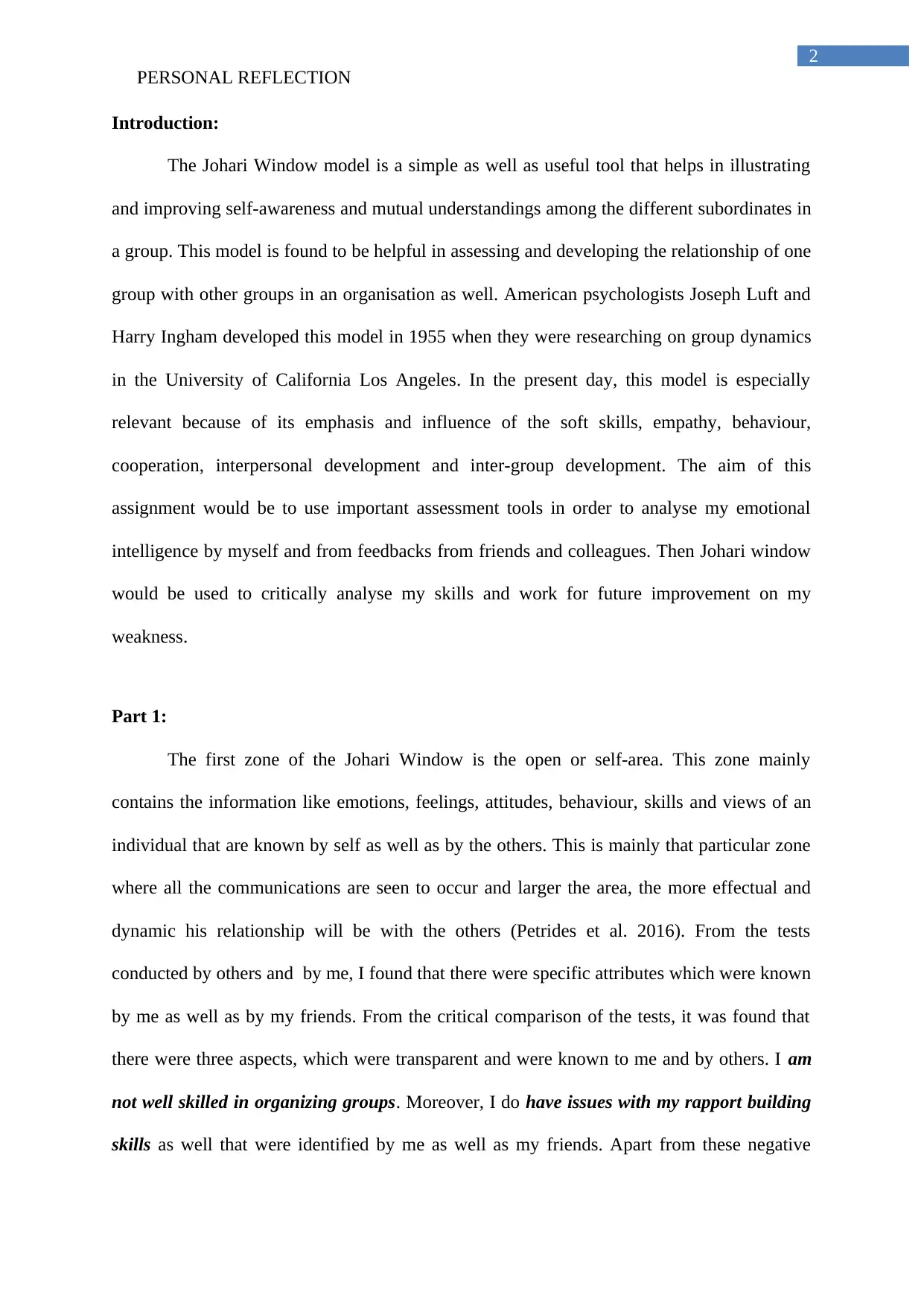
2
PERSONAL REFLECTION
Introduction:
The Johari Window model is a simple as well as useful tool that helps in illustrating
and improving self-awareness and mutual understandings among the different subordinates in
a group. This model is found to be helpful in assessing and developing the relationship of one
group with other groups in an organisation as well. American psychologists Joseph Luft and
Harry Ingham developed this model in 1955 when they were researching on group dynamics
in the University of California Los Angeles. In the present day, this model is especially
relevant because of its emphasis and influence of the soft skills, empathy, behaviour,
cooperation, interpersonal development and inter-group development. The aim of this
assignment would be to use important assessment tools in order to analyse my emotional
intelligence by myself and from feedbacks from friends and colleagues. Then Johari window
would be used to critically analyse my skills and work for future improvement on my
weakness.
Part 1:
The first zone of the Johari Window is the open or self-area. This zone mainly
contains the information like emotions, feelings, attitudes, behaviour, skills and views of an
individual that are known by self as well as by the others. This is mainly that particular zone
where all the communications are seen to occur and larger the area, the more effectual and
dynamic his relationship will be with the others (Petrides et al. 2016). From the tests
conducted by others and by me, I found that there were specific attributes which were known
by me as well as by my friends. From the critical comparison of the tests, it was found that
there were three aspects, which were transparent and were known to me and by others. I am
not well skilled in organizing groups. Moreover, I do have issues with my rapport building
skills as well that were identified by me as well as my friends. Apart from these negative
PERSONAL REFLECTION
Introduction:
The Johari Window model is a simple as well as useful tool that helps in illustrating
and improving self-awareness and mutual understandings among the different subordinates in
a group. This model is found to be helpful in assessing and developing the relationship of one
group with other groups in an organisation as well. American psychologists Joseph Luft and
Harry Ingham developed this model in 1955 when they were researching on group dynamics
in the University of California Los Angeles. In the present day, this model is especially
relevant because of its emphasis and influence of the soft skills, empathy, behaviour,
cooperation, interpersonal development and inter-group development. The aim of this
assignment would be to use important assessment tools in order to analyse my emotional
intelligence by myself and from feedbacks from friends and colleagues. Then Johari window
would be used to critically analyse my skills and work for future improvement on my
weakness.
Part 1:
The first zone of the Johari Window is the open or self-area. This zone mainly
contains the information like emotions, feelings, attitudes, behaviour, skills and views of an
individual that are known by self as well as by the others. This is mainly that particular zone
where all the communications are seen to occur and larger the area, the more effectual and
dynamic his relationship will be with the others (Petrides et al. 2016). From the tests
conducted by others and by me, I found that there were specific attributes which were known
by me as well as by my friends. From the critical comparison of the tests, it was found that
there were three aspects, which were transparent and were known to me and by others. I am
not well skilled in organizing groups. Moreover, I do have issues with my rapport building
skills as well that were identified by me as well as my friends. Apart from these negative
⊘ This is a preview!⊘
Do you want full access?
Subscribe today to unlock all pages.

Trusted by 1+ million students worldwide
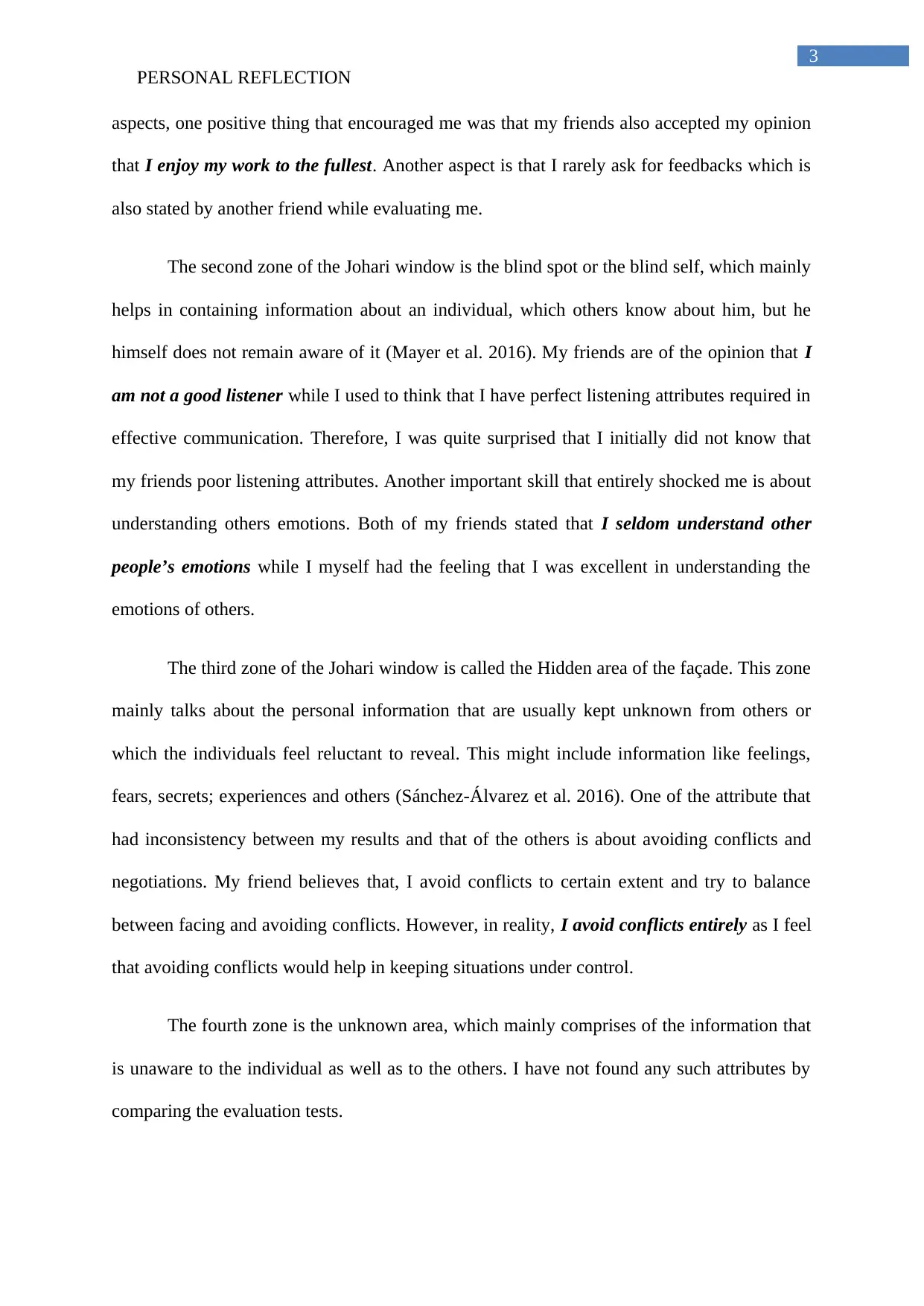
3
PERSONAL REFLECTION
aspects, one positive thing that encouraged me was that my friends also accepted my opinion
that I enjoy my work to the fullest. Another aspect is that I rarely ask for feedbacks which is
also stated by another friend while evaluating me.
The second zone of the Johari window is the blind spot or the blind self, which mainly
helps in containing information about an individual, which others know about him, but he
himself does not remain aware of it (Mayer et al. 2016). My friends are of the opinion that I
am not a good listener while I used to think that I have perfect listening attributes required in
effective communication. Therefore, I was quite surprised that I initially did not know that
my friends poor listening attributes. Another important skill that entirely shocked me is about
understanding others emotions. Both of my friends stated that I seldom understand other
people’s emotions while I myself had the feeling that I was excellent in understanding the
emotions of others.
The third zone of the Johari window is called the Hidden area of the façade. This zone
mainly talks about the personal information that are usually kept unknown from others or
which the individuals feel reluctant to reveal. This might include information like feelings,
fears, secrets; experiences and others (Sánchez-Álvarez et al. 2016). One of the attribute that
had inconsistency between my results and that of the others is about avoiding conflicts and
negotiations. My friend believes that, I avoid conflicts to certain extent and try to balance
between facing and avoiding conflicts. However, in reality, I avoid conflicts entirely as I feel
that avoiding conflicts would help in keeping situations under control.
The fourth zone is the unknown area, which mainly comprises of the information that
is unaware to the individual as well as to the others. I have not found any such attributes by
comparing the evaluation tests.
PERSONAL REFLECTION
aspects, one positive thing that encouraged me was that my friends also accepted my opinion
that I enjoy my work to the fullest. Another aspect is that I rarely ask for feedbacks which is
also stated by another friend while evaluating me.
The second zone of the Johari window is the blind spot or the blind self, which mainly
helps in containing information about an individual, which others know about him, but he
himself does not remain aware of it (Mayer et al. 2016). My friends are of the opinion that I
am not a good listener while I used to think that I have perfect listening attributes required in
effective communication. Therefore, I was quite surprised that I initially did not know that
my friends poor listening attributes. Another important skill that entirely shocked me is about
understanding others emotions. Both of my friends stated that I seldom understand other
people’s emotions while I myself had the feeling that I was excellent in understanding the
emotions of others.
The third zone of the Johari window is called the Hidden area of the façade. This zone
mainly talks about the personal information that are usually kept unknown from others or
which the individuals feel reluctant to reveal. This might include information like feelings,
fears, secrets; experiences and others (Sánchez-Álvarez et al. 2016). One of the attribute that
had inconsistency between my results and that of the others is about avoiding conflicts and
negotiations. My friend believes that, I avoid conflicts to certain extent and try to balance
between facing and avoiding conflicts. However, in reality, I avoid conflicts entirely as I feel
that avoiding conflicts would help in keeping situations under control.
The fourth zone is the unknown area, which mainly comprises of the information that
is unaware to the individual as well as to the others. I have not found any such attributes by
comparing the evaluation tests.
Paraphrase This Document
Need a fresh take? Get an instant paraphrase of this document with our AI Paraphraser
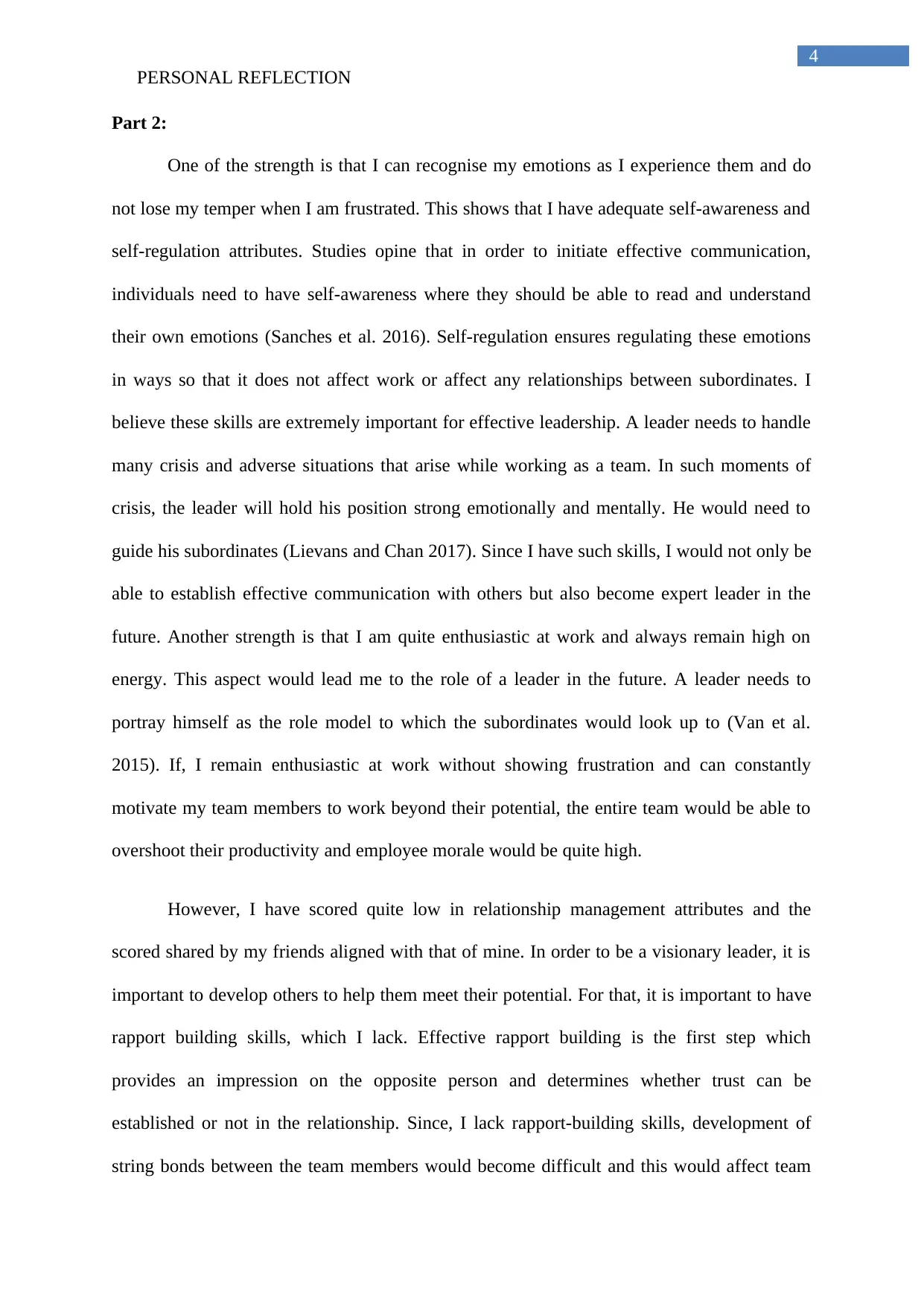
4
PERSONAL REFLECTION
Part 2:
One of the strength is that I can recognise my emotions as I experience them and do
not lose my temper when I am frustrated. This shows that I have adequate self-awareness and
self-regulation attributes. Studies opine that in order to initiate effective communication,
individuals need to have self-awareness where they should be able to read and understand
their own emotions (Sanches et al. 2016). Self-regulation ensures regulating these emotions
in ways so that it does not affect work or affect any relationships between subordinates. I
believe these skills are extremely important for effective leadership. A leader needs to handle
many crisis and adverse situations that arise while working as a team. In such moments of
crisis, the leader will hold his position strong emotionally and mentally. He would need to
guide his subordinates (Lievans and Chan 2017). Since I have such skills, I would not only be
able to establish effective communication with others but also become expert leader in the
future. Another strength is that I am quite enthusiastic at work and always remain high on
energy. This aspect would lead me to the role of a leader in the future. A leader needs to
portray himself as the role model to which the subordinates would look up to (Van et al.
2015). If, I remain enthusiastic at work without showing frustration and can constantly
motivate my team members to work beyond their potential, the entire team would be able to
overshoot their productivity and employee morale would be quite high.
However, I have scored quite low in relationship management attributes and the
scored shared by my friends aligned with that of mine. In order to be a visionary leader, it is
important to develop others to help them meet their potential. For that, it is important to have
rapport building skills, which I lack. Effective rapport building is the first step which
provides an impression on the opposite person and determines whether trust can be
established or not in the relationship. Since, I lack rapport-building skills, development of
string bonds between the team members would become difficult and this would affect team
PERSONAL REFLECTION
Part 2:
One of the strength is that I can recognise my emotions as I experience them and do
not lose my temper when I am frustrated. This shows that I have adequate self-awareness and
self-regulation attributes. Studies opine that in order to initiate effective communication,
individuals need to have self-awareness where they should be able to read and understand
their own emotions (Sanches et al. 2016). Self-regulation ensures regulating these emotions
in ways so that it does not affect work or affect any relationships between subordinates. I
believe these skills are extremely important for effective leadership. A leader needs to handle
many crisis and adverse situations that arise while working as a team. In such moments of
crisis, the leader will hold his position strong emotionally and mentally. He would need to
guide his subordinates (Lievans and Chan 2017). Since I have such skills, I would not only be
able to establish effective communication with others but also become expert leader in the
future. Another strength is that I am quite enthusiastic at work and always remain high on
energy. This aspect would lead me to the role of a leader in the future. A leader needs to
portray himself as the role model to which the subordinates would look up to (Van et al.
2015). If, I remain enthusiastic at work without showing frustration and can constantly
motivate my team members to work beyond their potential, the entire team would be able to
overshoot their productivity and employee morale would be quite high.
However, I have scored quite low in relationship management attributes and the
scored shared by my friends aligned with that of mine. In order to be a visionary leader, it is
important to develop others to help them meet their potential. For that, it is important to have
rapport building skills, which I lack. Effective rapport building is the first step which
provides an impression on the opposite person and determines whether trust can be
established or not in the relationship. Since, I lack rapport-building skills, development of
string bonds between the team members would become difficult and this would affect team
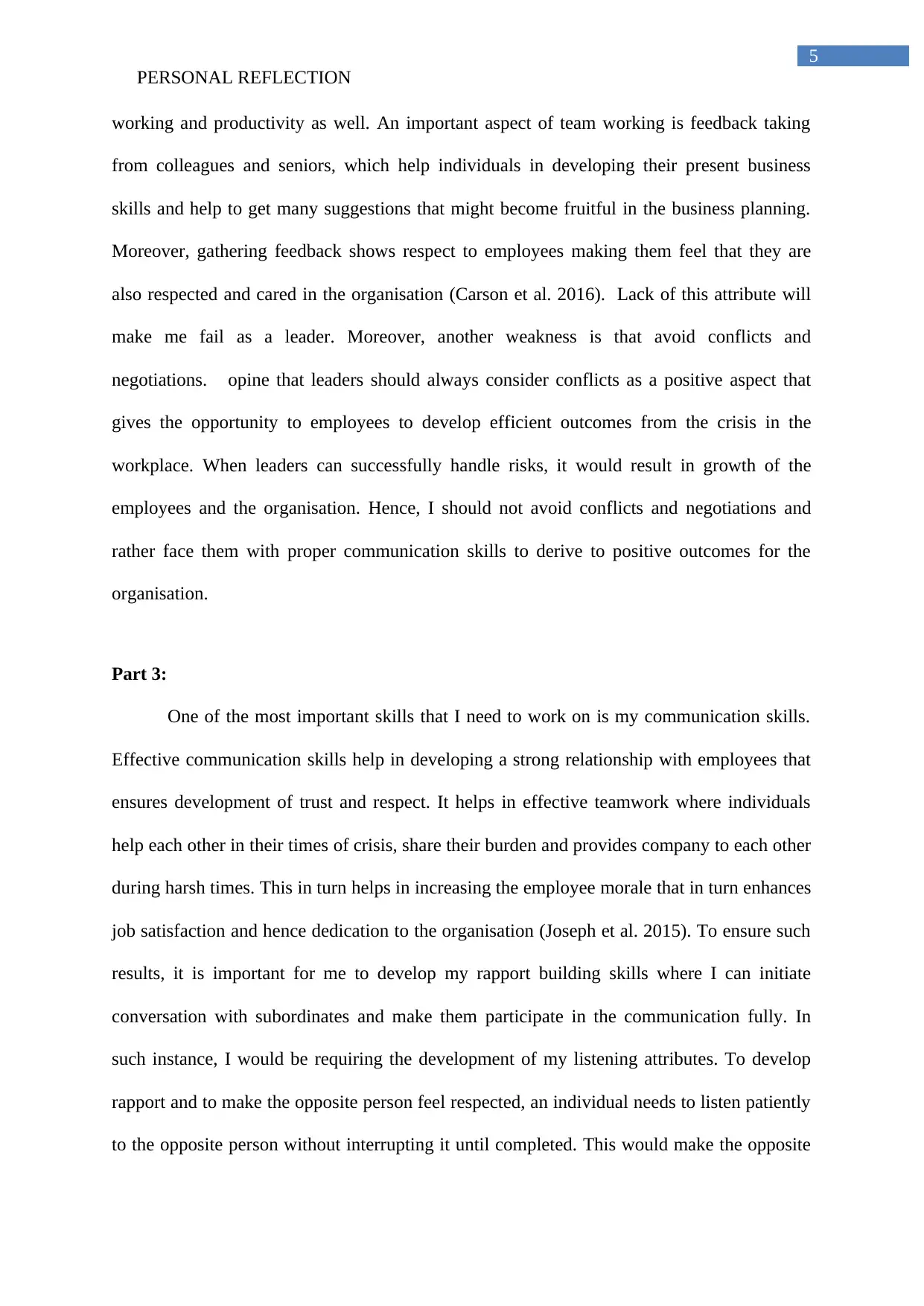
5
PERSONAL REFLECTION
working and productivity as well. An important aspect of team working is feedback taking
from colleagues and seniors, which help individuals in developing their present business
skills and help to get many suggestions that might become fruitful in the business planning.
Moreover, gathering feedback shows respect to employees making them feel that they are
also respected and cared in the organisation (Carson et al. 2016). Lack of this attribute will
make me fail as a leader. Moreover, another weakness is that avoid conflicts and
negotiations. opine that leaders should always consider conflicts as a positive aspect that
gives the opportunity to employees to develop efficient outcomes from the crisis in the
workplace. When leaders can successfully handle risks, it would result in growth of the
employees and the organisation. Hence, I should not avoid conflicts and negotiations and
rather face them with proper communication skills to derive to positive outcomes for the
organisation.
Part 3:
One of the most important skills that I need to work on is my communication skills.
Effective communication skills help in developing a strong relationship with employees that
ensures development of trust and respect. It helps in effective teamwork where individuals
help each other in their times of crisis, share their burden and provides company to each other
during harsh times. This in turn helps in increasing the employee morale that in turn enhances
job satisfaction and hence dedication to the organisation (Joseph et al. 2015). To ensure such
results, it is important for me to develop my rapport building skills where I can initiate
conversation with subordinates and make them participate in the communication fully. In
such instance, I would be requiring the development of my listening attributes. To develop
rapport and to make the opposite person feel respected, an individual needs to listen patiently
to the opposite person without interrupting it until completed. This would make the opposite
PERSONAL REFLECTION
working and productivity as well. An important aspect of team working is feedback taking
from colleagues and seniors, which help individuals in developing their present business
skills and help to get many suggestions that might become fruitful in the business planning.
Moreover, gathering feedback shows respect to employees making them feel that they are
also respected and cared in the organisation (Carson et al. 2016). Lack of this attribute will
make me fail as a leader. Moreover, another weakness is that avoid conflicts and
negotiations. opine that leaders should always consider conflicts as a positive aspect that
gives the opportunity to employees to develop efficient outcomes from the crisis in the
workplace. When leaders can successfully handle risks, it would result in growth of the
employees and the organisation. Hence, I should not avoid conflicts and negotiations and
rather face them with proper communication skills to derive to positive outcomes for the
organisation.
Part 3:
One of the most important skills that I need to work on is my communication skills.
Effective communication skills help in developing a strong relationship with employees that
ensures development of trust and respect. It helps in effective teamwork where individuals
help each other in their times of crisis, share their burden and provides company to each other
during harsh times. This in turn helps in increasing the employee morale that in turn enhances
job satisfaction and hence dedication to the organisation (Joseph et al. 2015). To ensure such
results, it is important for me to develop my rapport building skills where I can initiate
conversation with subordinates and make them participate in the communication fully. In
such instance, I would be requiring the development of my listening attributes. To develop
rapport and to make the opposite person feel respected, an individual needs to listen patiently
to the opposite person without interrupting it until completed. This would make the opposite
⊘ This is a preview!⊘
Do you want full access?
Subscribe today to unlock all pages.

Trusted by 1+ million students worldwide
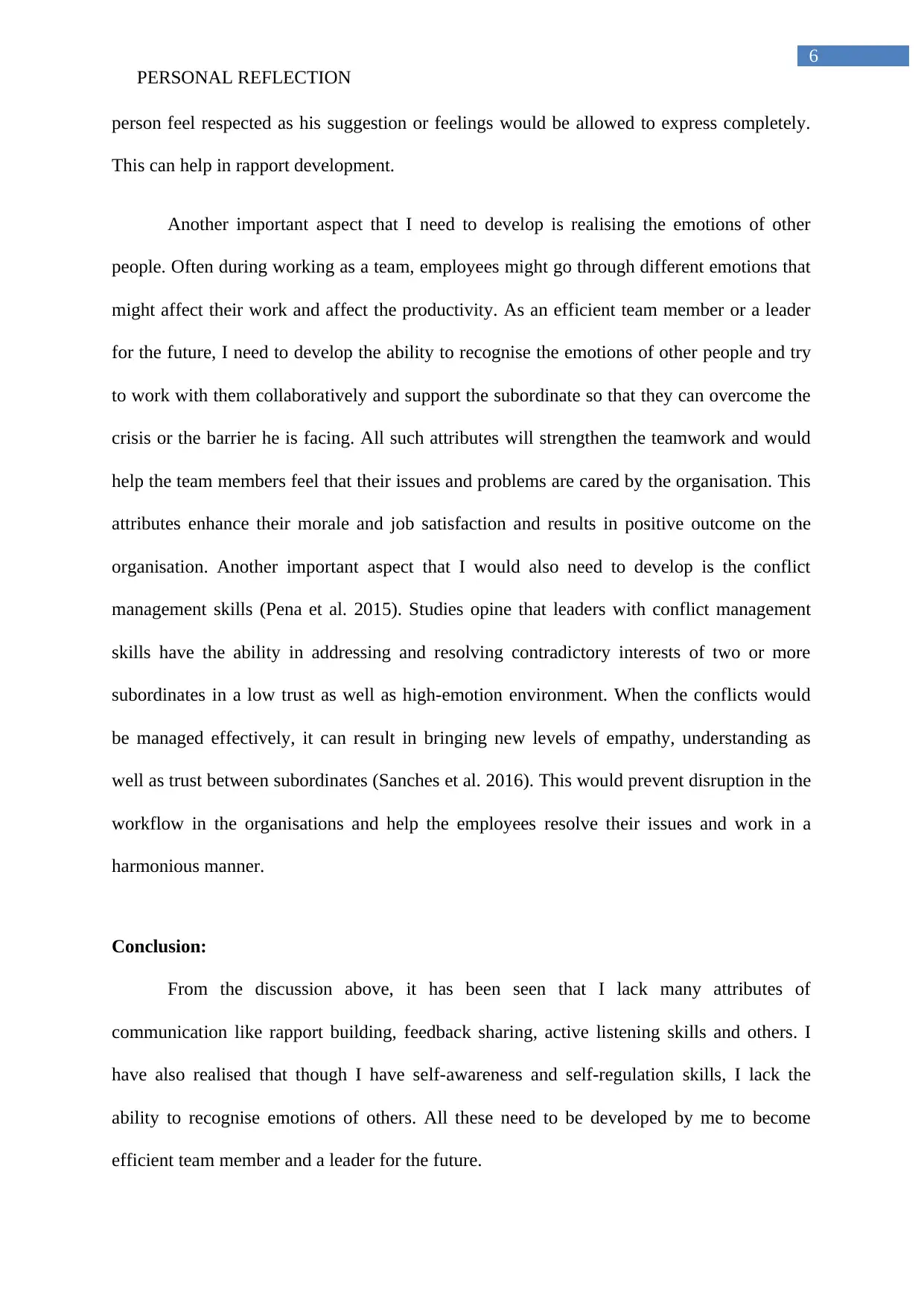
6
PERSONAL REFLECTION
person feel respected as his suggestion or feelings would be allowed to express completely.
This can help in rapport development.
Another important aspect that I need to develop is realising the emotions of other
people. Often during working as a team, employees might go through different emotions that
might affect their work and affect the productivity. As an efficient team member or a leader
for the future, I need to develop the ability to recognise the emotions of other people and try
to work with them collaboratively and support the subordinate so that they can overcome the
crisis or the barrier he is facing. All such attributes will strengthen the teamwork and would
help the team members feel that their issues and problems are cared by the organisation. This
attributes enhance their morale and job satisfaction and results in positive outcome on the
organisation. Another important aspect that I would also need to develop is the conflict
management skills (Pena et al. 2015). Studies opine that leaders with conflict management
skills have the ability in addressing and resolving contradictory interests of two or more
subordinates in a low trust as well as high-emotion environment. When the conflicts would
be managed effectively, it can result in bringing new levels of empathy, understanding as
well as trust between subordinates (Sanches et al. 2016). This would prevent disruption in the
workflow in the organisations and help the employees resolve their issues and work in a
harmonious manner.
Conclusion:
From the discussion above, it has been seen that I lack many attributes of
communication like rapport building, feedback sharing, active listening skills and others. I
have also realised that though I have self-awareness and self-regulation skills, I lack the
ability to recognise emotions of others. All these need to be developed by me to become
efficient team member and a leader for the future.
PERSONAL REFLECTION
person feel respected as his suggestion or feelings would be allowed to express completely.
This can help in rapport development.
Another important aspect that I need to develop is realising the emotions of other
people. Often during working as a team, employees might go through different emotions that
might affect their work and affect the productivity. As an efficient team member or a leader
for the future, I need to develop the ability to recognise the emotions of other people and try
to work with them collaboratively and support the subordinate so that they can overcome the
crisis or the barrier he is facing. All such attributes will strengthen the teamwork and would
help the team members feel that their issues and problems are cared by the organisation. This
attributes enhance their morale and job satisfaction and results in positive outcome on the
organisation. Another important aspect that I would also need to develop is the conflict
management skills (Pena et al. 2015). Studies opine that leaders with conflict management
skills have the ability in addressing and resolving contradictory interests of two or more
subordinates in a low trust as well as high-emotion environment. When the conflicts would
be managed effectively, it can result in bringing new levels of empathy, understanding as
well as trust between subordinates (Sanches et al. 2016). This would prevent disruption in the
workflow in the organisations and help the employees resolve their issues and work in a
harmonious manner.
Conclusion:
From the discussion above, it has been seen that I lack many attributes of
communication like rapport building, feedback sharing, active listening skills and others. I
have also realised that though I have self-awareness and self-regulation skills, I lack the
ability to recognise emotions of others. All these need to be developed by me to become
efficient team member and a leader for the future.
Paraphrase This Document
Need a fresh take? Get an instant paraphrase of this document with our AI Paraphraser
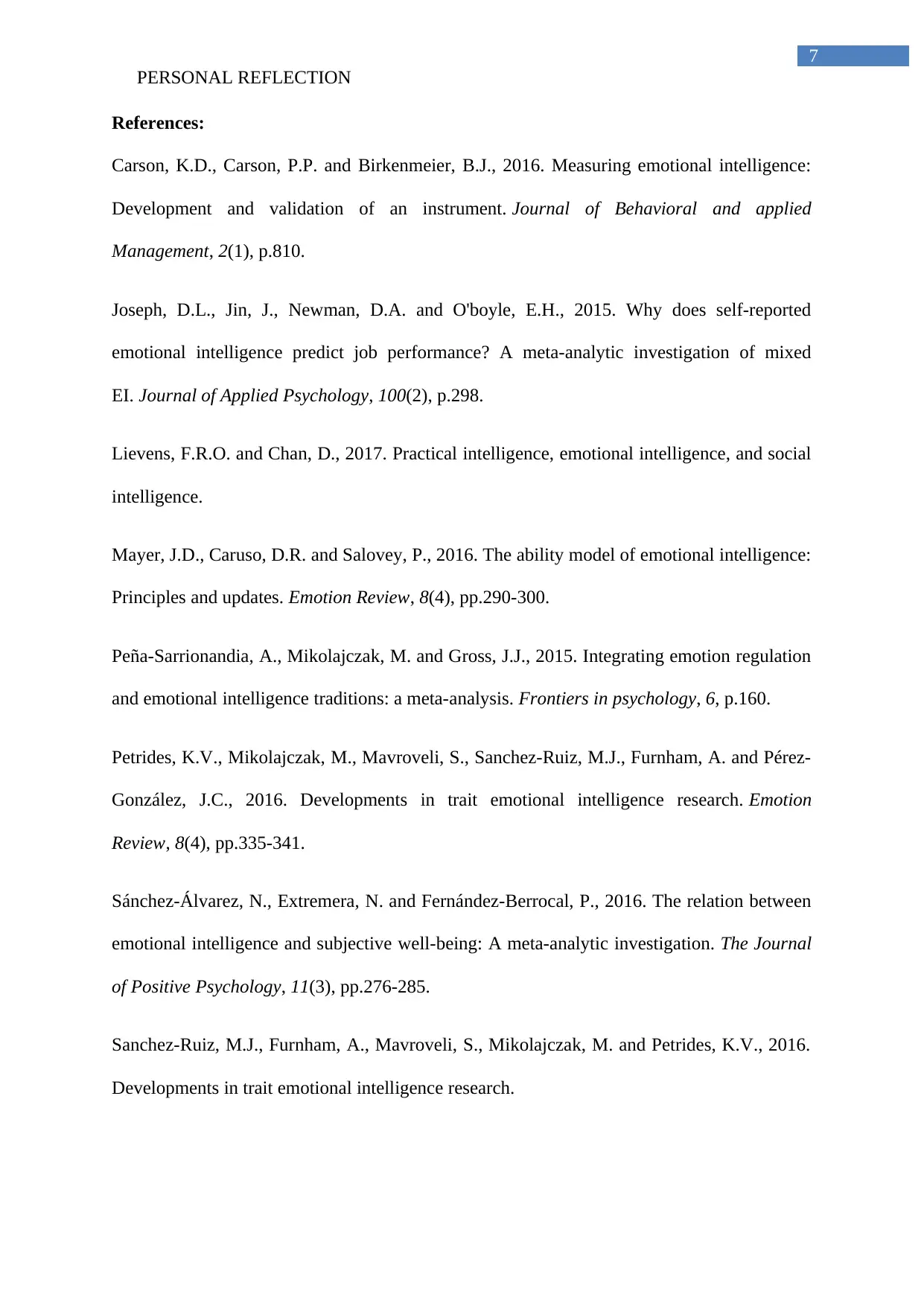
7
PERSONAL REFLECTION
References:
Carson, K.D., Carson, P.P. and Birkenmeier, B.J., 2016. Measuring emotional intelligence:
Development and validation of an instrument. Journal of Behavioral and applied
Management, 2(1), p.810.
Joseph, D.L., Jin, J., Newman, D.A. and O'boyle, E.H., 2015. Why does self-reported
emotional intelligence predict job performance? A meta-analytic investigation of mixed
EI. Journal of Applied Psychology, 100(2), p.298.
Lievens, F.R.O. and Chan, D., 2017. Practical intelligence, emotional intelligence, and social
intelligence.
Mayer, J.D., Caruso, D.R. and Salovey, P., 2016. The ability model of emotional intelligence:
Principles and updates. Emotion Review, 8(4), pp.290-300.
Peña-Sarrionandia, A., Mikolajczak, M. and Gross, J.J., 2015. Integrating emotion regulation
and emotional intelligence traditions: a meta-analysis. Frontiers in psychology, 6, p.160.
Petrides, K.V., Mikolajczak, M., Mavroveli, S., Sanchez-Ruiz, M.J., Furnham, A. and Pérez-
González, J.C., 2016. Developments in trait emotional intelligence research. Emotion
Review, 8(4), pp.335-341.
Sánchez-Álvarez, N., Extremera, N. and Fernández-Berrocal, P., 2016. The relation between
emotional intelligence and subjective well-being: A meta-analytic investigation. The Journal
of Positive Psychology, 11(3), pp.276-285.
Sanchez-Ruiz, M.J., Furnham, A., Mavroveli, S., Mikolajczak, M. and Petrides, K.V., 2016.
Developments in trait emotional intelligence research.
PERSONAL REFLECTION
References:
Carson, K.D., Carson, P.P. and Birkenmeier, B.J., 2016. Measuring emotional intelligence:
Development and validation of an instrument. Journal of Behavioral and applied
Management, 2(1), p.810.
Joseph, D.L., Jin, J., Newman, D.A. and O'boyle, E.H., 2015. Why does self-reported
emotional intelligence predict job performance? A meta-analytic investigation of mixed
EI. Journal of Applied Psychology, 100(2), p.298.
Lievens, F.R.O. and Chan, D., 2017. Practical intelligence, emotional intelligence, and social
intelligence.
Mayer, J.D., Caruso, D.R. and Salovey, P., 2016. The ability model of emotional intelligence:
Principles and updates. Emotion Review, 8(4), pp.290-300.
Peña-Sarrionandia, A., Mikolajczak, M. and Gross, J.J., 2015. Integrating emotion regulation
and emotional intelligence traditions: a meta-analysis. Frontiers in psychology, 6, p.160.
Petrides, K.V., Mikolajczak, M., Mavroveli, S., Sanchez-Ruiz, M.J., Furnham, A. and Pérez-
González, J.C., 2016. Developments in trait emotional intelligence research. Emotion
Review, 8(4), pp.335-341.
Sánchez-Álvarez, N., Extremera, N. and Fernández-Berrocal, P., 2016. The relation between
emotional intelligence and subjective well-being: A meta-analytic investigation. The Journal
of Positive Psychology, 11(3), pp.276-285.
Sanchez-Ruiz, M.J., Furnham, A., Mavroveli, S., Mikolajczak, M. and Petrides, K.V., 2016.
Developments in trait emotional intelligence research.
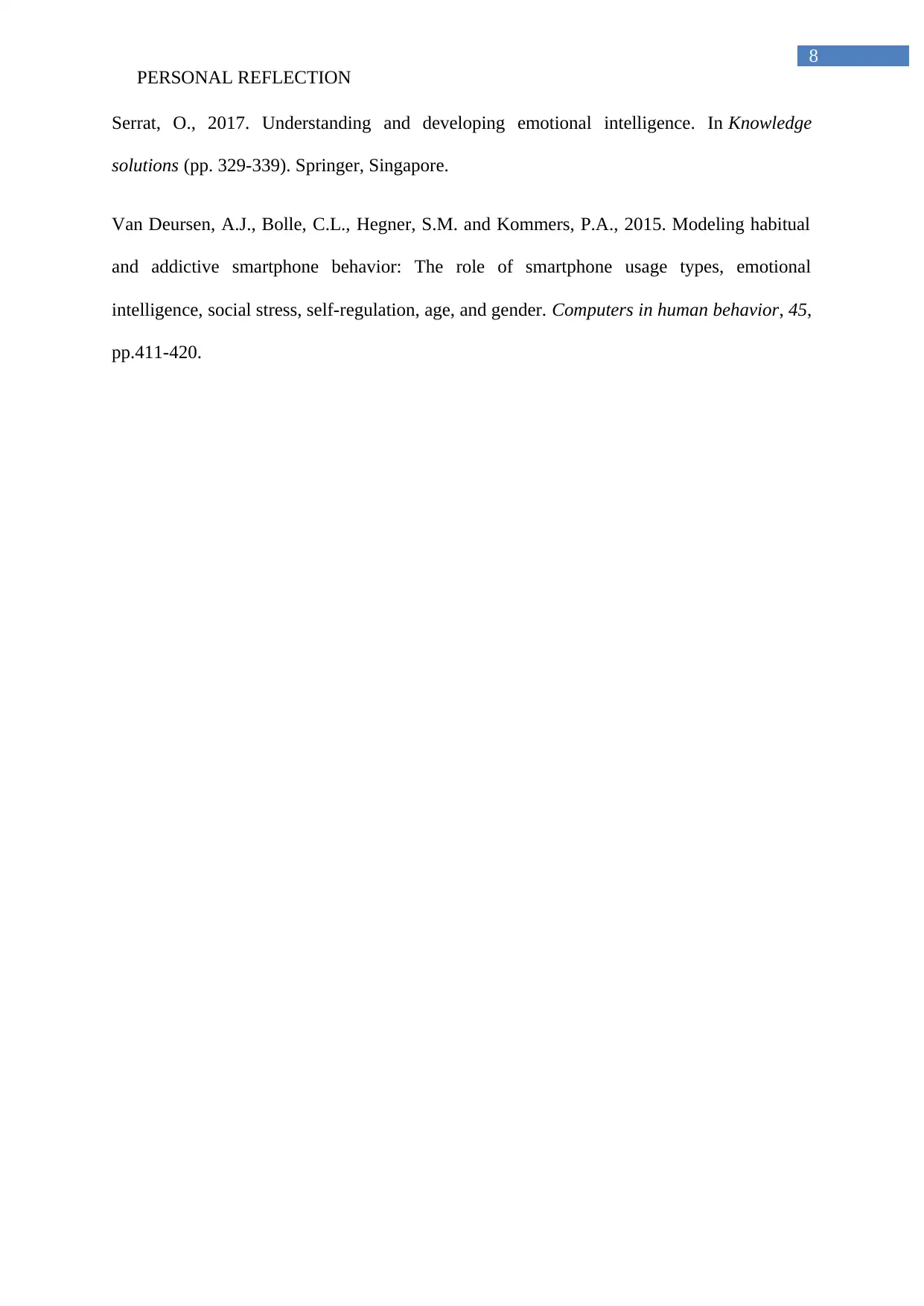
8
PERSONAL REFLECTION
Serrat, O., 2017. Understanding and developing emotional intelligence. In Knowledge
solutions (pp. 329-339). Springer, Singapore.
Van Deursen, A.J., Bolle, C.L., Hegner, S.M. and Kommers, P.A., 2015. Modeling habitual
and addictive smartphone behavior: The role of smartphone usage types, emotional
intelligence, social stress, self-regulation, age, and gender. Computers in human behavior, 45,
pp.411-420.
PERSONAL REFLECTION
Serrat, O., 2017. Understanding and developing emotional intelligence. In Knowledge
solutions (pp. 329-339). Springer, Singapore.
Van Deursen, A.J., Bolle, C.L., Hegner, S.M. and Kommers, P.A., 2015. Modeling habitual
and addictive smartphone behavior: The role of smartphone usage types, emotional
intelligence, social stress, self-regulation, age, and gender. Computers in human behavior, 45,
pp.411-420.
⊘ This is a preview!⊘
Do you want full access?
Subscribe today to unlock all pages.

Trusted by 1+ million students worldwide
1 out of 9
Related Documents
Your All-in-One AI-Powered Toolkit for Academic Success.
+13062052269
info@desklib.com
Available 24*7 on WhatsApp / Email
![[object Object]](/_next/static/media/star-bottom.7253800d.svg)
Unlock your academic potential
Copyright © 2020–2026 A2Z Services. All Rights Reserved. Developed and managed by ZUCOL.





